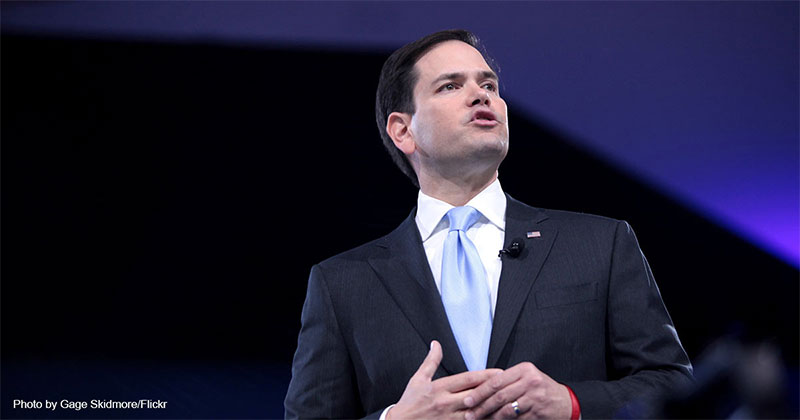
On Thursday, Senator Marco Rubio (R-Fla.) introduced legislation that would prevent individuals who identify as transgender or who have gender dysphoria from serving in the military, with some exceptions. Rep. Jim Banks (R-Ind.) introduced companion legislation in the House. The lawmakers have emphasized that the bill’s purpose is to help the Pentagon stay focused on “military readiness” and not on complications that ensue from gender confusion in the ranks.
“The military has strict standards for who can and cannot qualify to serve,” said Rubio in a press release. “For example, under President Biden, you can’t serve with a peanut allergy. Biden has turned our military into a woke social experiment. It is a stupid way to go about protecting our nation. We need to spend more time thinking about how to counter threats like China, Russia, and North Korea and less time thinking about pronouns.”
The Ensuring Military Readiness Act would build on the requirements that former President Trump issued in 2018 that barred those with gender dysphoria or who were undergoing gender transition procedures from enlisting. Five days into his presidency, Biden rescinded the order. Rubio’s bill would restore the Trump-era regulations by restricting those who actively identify as transgender, who seek or have already undergone gender reassignment surgery, or who have a history or have been diagnosed with gender dysphoria.
Exceptions to the rule for troops with a history gender dysphoria include those who have been stable in their biological sex for 36 months prior to joining and those who are already serving and remain deployable according to the standards of their biological sex (who may receive medically necessary treatment, which would exclude transition surgery and hormone therapy).
Banks identified the need for the military to uphold its medical standards in order to ensure battle readiness.
“Americans who were treated for ADHD in the past two years must receive a waiver to enlist,” said Banks. “Our military holds recruits to stringent medical standards for a reason and the Biden administration’s special carveout for those suffering from gender dysphoria was purely political. Our bill ensures that [the] DOD puts lethality and readiness before far-left ideology.”
Research shows that allowing individuals who actively identify as transgender and who demand medical treatments such as gender transitions surgeries and hormone treatments to serve in the military could cost anywhere between $1.9 and $3.7 billion in taxpayer funds over 10 years.
In 2018, the Department of Defense released recommendations for why barring transgender-identifying individuals from the military was necessary. They cited mental health concerns, including high rates of anxiety, depression, substance use disorders, suicide ideation, attempts, and completion. They also noted that “Service members with gender dysphoria are eight times more likely to attempt suicide than Service members as a whole” and “nine times more likely to have mental health encounters.”
The DOD further emphasized physical health concerns, including the fact that combat deployments anywhere in the world are often part of military service without the expectation of specialized medical care, which is required for gender transition procedures. Also cited was the concern over duty limitations that gender transition procedures would cause. Research indicates that these procedures could cause troops to be nondeployable anywhere from 111 to 135 days.
Other issues highlighted by the DOD include the private spaces of one sex, such as bathroom and shower facilities, being open to the opposite sex, which the department argues would undermine the “reasonable expectations of privacy” that both sexes have. Additionally, the department pointed to problems that could arise from trans-identifying individuals of both sexes being held to the opposite military physical standards of their biological sex.
The DOD concluded that “exempting such persons for well-established mental health, physical health, and sex-based standards, which apply to all Service members, could undermine readiness, disrupt unit cohesion, and impose an unreasonable burden on the military that is not conducive to military effectiveness and lethality.”
Military experts are voicing similar concerns over the prospect of transgender-identifying individuals serving in the armed forces, particularly with the current global challenges facing U.S. troops.
“Senator Rubio’s efforts to deal with the issue of transgender-identifying individuals in the military are to be lauded,” said Lt. Gen. (Ret.) William G. Boykin, who serves as executive vice president of Family Research Council. “The senator clearly understands that at a time when China is flying surveillance platforms into our airspace and becoming more and more belligerent and provocative that our precious dollars and time need to go into preparing our military for war. The notion that we can continue prioritizing making our military more ‘woke’ is a specious notion.”
“Every decision made by the president and Congress regarding our military should be made with the readiness of our military in mind,” Boykin concluded. “What the senator is proposing would set us on a pathway to spend our time and money preparing for war with not only China but other adversaries that loom on the horizon.”
















